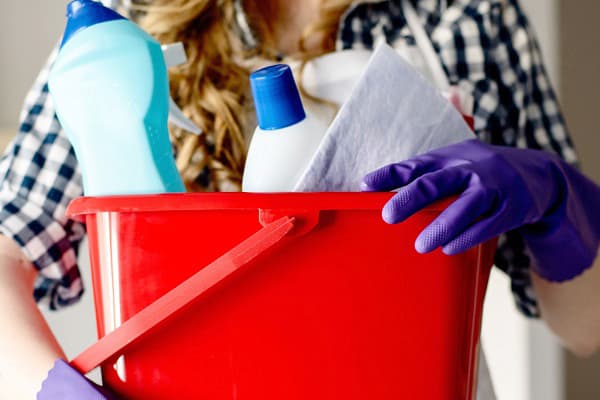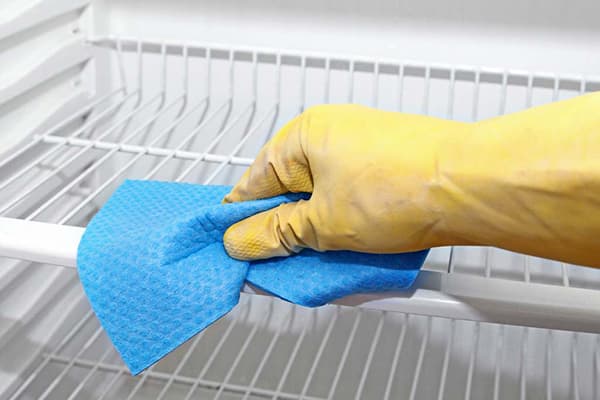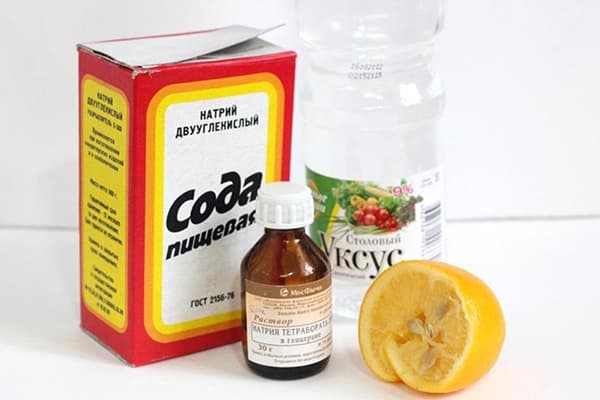Is it possible to clean a refrigerator with bleach inside and outside?
Chloride of lime is widely used in everyday life for bleaching and disinfecting a wide variety of surfaces. Is it possible to clean a refrigerator with bleach? The use of such aggressive chemistry is undesirable. Manufacturers of refrigeration equipment recommend gentle care. There are special detergents based on alcohol, surfactants, acetic acid, solvent, and hydrogen peroxide. Among the traditional methods, it is much more acceptable to wash the refrigerator with baking soda or a vinegar solution. There are many products that help better in emergency situations than bleach.

Why shouldn't you use bleach?
Bleach is an inexpensive and popular remedy. It is used for purification and disinfection of drinking water for the population, in industry and medicine production, for cleaning bathrooms and hospital wards. Bleach helps get rid of foreign odors, whitens and destroys bacteria. However, it is better not to use it for the refrigerator. There are several reasons for this:
- Poor ventilation and long-lasting chlorine smell. After treatment with bleach, even in a well-ventilated area, a specific pungent odor persists for several hours. It disappears from the refrigerator many times worse and takes longer. The solution may remain under the rubber bands or get into the inside of the equipment. When using bleach, it is important to be able to rinse the product off with running water.
- Damage to refrigeration equipment parts. Many modern materials do not tolerate the use of chlorine (acrylic, silicone, etc.). Refrigerator parts may become discolored or deformed.
- Danger of use. Chloride of lime causes chemical burns not only when it comes into contact with the skin and mucous membranes, but also when its vapors are inhaled. Washing with bleach can result in bronchospasm, pulmonary edema, severe poisoning, and an acute allergic reaction.
Cleaning the refrigerator with bleach is impractical and dangerous. There are many other effective means for this. It would be right to choose something more gentle.
If you decide to wash your refrigerator with chlorine...
Despite the caustic nature of bleach, many housewives love and respect it. With its help they fight yellowness on household appliances, mold, and unpleasant odors.
If you decide to wash the refrigerator with a chlorine solution, you should follow important rules:
- Wear a mask and rubber gloves to avoid chemical burns.
- Open the windows and doors wide open.
- Turn off the power to the refrigerator. Take out all the food and wait until it is completely defrosted.
- Saturate a rag with a small amount of the solution and apply to the outside of the refrigerator. After 5–10 minutes, rinse the surface thoroughly with warm water.
- All removable parts and shelves should be removed before processing. Then you can apply bleach to them and after a while wash them off with tap water.
- If necessary, wipe down the inside of the refrigerator walls. Avoid getting bleach under the rubber bands and into the drain to drain water.
- Rinse surfaces thoroughly with clean water.
After processing, the refrigerator must be left open for at least 6 hours. It is also advisable to leave doors and windows open to allow air movement.
Alternative to bleach
There are many refrigerator cleaning products that can help deal with a wide variety of stains.
Equipment manufacturers recommend professional care using special chemicals:
- HG, refrigerator cleaner;
- Sano Refrigerator Cleaner;
- Bon spray;
- Green&Clean Professional;
Other folk remedies are much safer than bleach. For example, to bleach yellowed plastic, use soda and laundry soap. A solution of vinegar diluted in half with water will help eliminate the unpleasant odor. For the same purpose, crushed activated carbon is left in the refrigerator for several days.
In conclusion, we repeat: cleaning the refrigerator with bleach is not recommended. A separate line of household chemicals is produced to care for equipment. Bleach has a high level of danger and aggressiveness. It is better to choose an alternative cleaning agent - if not chemicals, then soda, vinegar, laundry soap.

